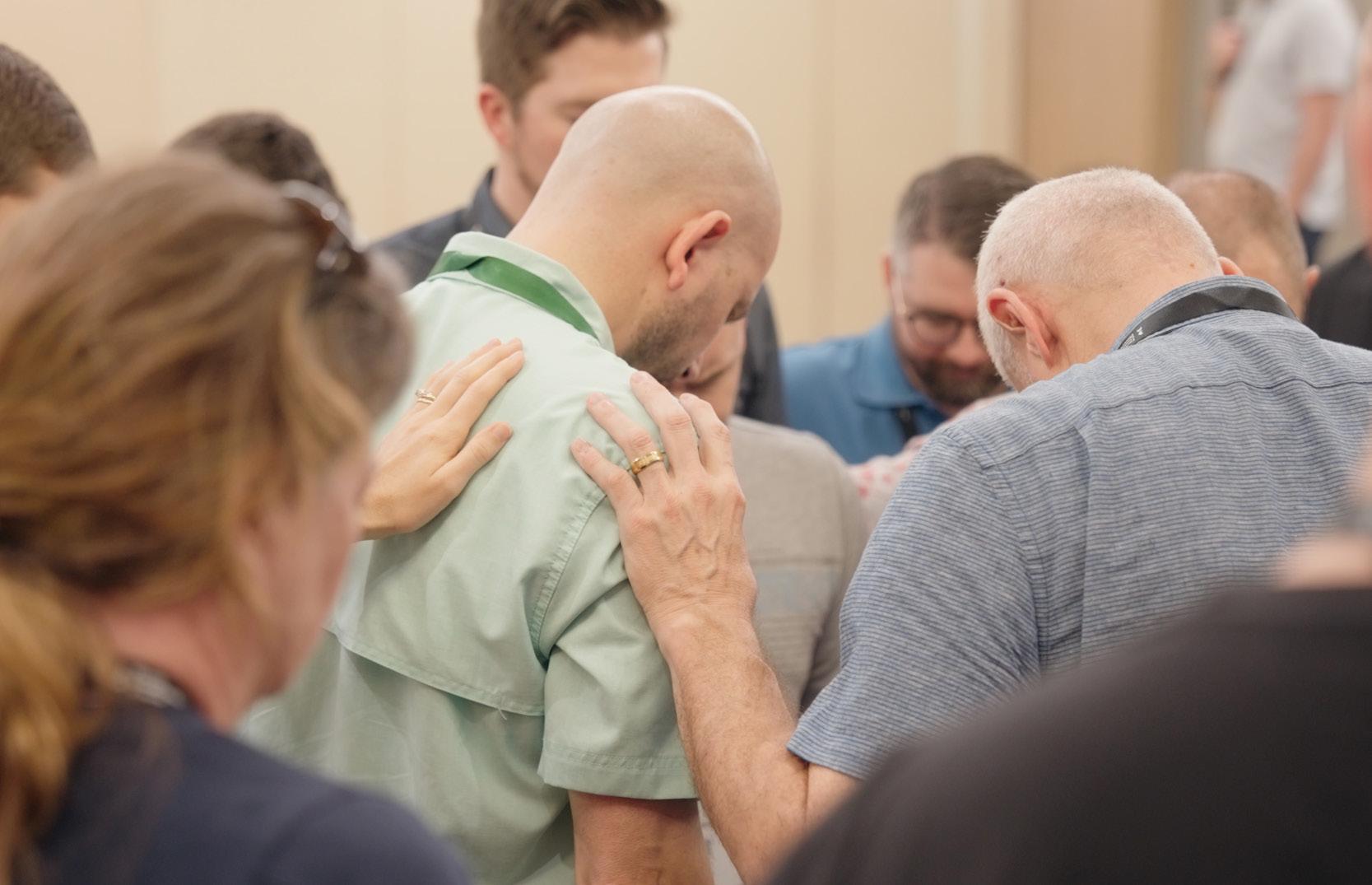RTIM REVIEW
A
INTO THE LORD’S WORK AT REACHING & TEACHING



Behold, how good and pleasant it is when brothers dwell in unity! - Psalm 133:1a
This verse came to mind numerous times over the last few months - especially last month in Southeast Asia as a number of our global team members gathered for a time of encouragement and refreshment. Families trekked thousands of miles, some over several days, to get to our location. We prayed together. We sang together. We sat under the preaching of the Scriptures together. We encouraged one another. We ate together. We laughed together. We strategized together. In unity. And it was good and pleasant.
Over the last four years, we’ve appointed over 100 units at Reaching & Teaching. I’ve had the privilege to get to know these units through the interview process and at Orientation. I’ve dreamed of these amazing gospel workers being in the same place together so that they can be encouraged by each other in the ways they encourage me. These folks are faithful, hard-working, gospelbelieving, and like-minded. They’re captivated by the glory of God and the primacy of local church in mission strategy.
At Reaching & Teaching, we’re committed to our reformed, baptistic,
and complementarian convictions. We believe our shared theology leads to deeper partnership and collaboration around the world. We’ve seen this conviction bear fruit in small gatherings and various online chats. But we hadn’t yet experienced it at this magnitude!
We were joined by dear friends John & Keri Folmar. John is the Senior Pastor of the Evangelical Christian Church of Dubai, a wonderful local church in the United Arab Emirates that is bearing fruit throughout the world through the ordinary means of grace and a vibrant pastoral internship. It’s been a joy to learn from the Folmars over the last four years and to have their daughter Ruth serve on our global team. It was an even greater joy to watch them love and serve our workers in Southeast Asia and to know that colleagues around the world were forming friendships that would be mutually encouraging for many years to come.
Matt Boswell joined us, too, bringing his wife and oldest son. We were able to sing songs that many of us often don’t get to sing while serving in isolated places in foreign tongues. Matt is the grandson of missionaries who served in Brazil. He’s written many meaningful songs over the years and it was sweet to watch him serve a new generation of gospel servants.
I loved watching friendships form between kids and adults alike. We’re already looking forward to the next time that we can be together for more encouragement, edification, and collaboration.
As we head into the next few months, we’re looking forward to our very first Sending Church Summit. It will be held in Louisville on July 8–9. We recently announced that Aaron Menikoff, who is one of our board members, and Jonathan Leeman will be giving our two main talks followed by an afternoon of breakouts specifically designed to serve local churches as they consider sending out qualified missionaries and caring well for those whom they’ve sent out. We’ve invited a number of pastors and missionaries who have encouraged us in how they’ve thought through the various elements of being a faithful sending church. You can sign up online at rtim.org. We’d love to see you there!
In the beginning of May, we’ll be at the first gathering of the Association of Churches for Missions and Evangelism (ACME), which we’ll be sponsoring. I love the priorities of this new association. Many ACME churches are already partnering with Reaching & Teaching. I’m looking forward to reconnecting with old friends and meeting some new ones. I’m thankful
for the partnerships we have with associations such as ACME and Pillar as they empower meaningful partnerships around the world in a way that echoes New Testament partnerships. Churches partnering to plant churches!
At the end of May, we’ll begin another class for our Practicum program. A number of 18–29-year-olds will descend on Washington, D.C. for a few days of orientation and worshiping with the saints at Capitol Hill Baptist Church before heading overseas for six weeks. I know our team members around the world are eagerly anticipating their arrival.
As always, I’m thankful for your partnership in the gospel. After witnessing the like-mindedness of our global team in Southeast Asia, I’m more excited than ever about the opportunities that lie ahead to make mature disciples, establish healthy churches, and train local leaders around the world.
Sincerely,
 Ryan Robertson
Ryan Robertson

Ryan Robertson has served as the President of Reaching & Teaching since April 2020. He has previously served in executive leadership positions for public companies and other non-profit organizations, and has been a board member of several charities. In 2014, he obtained his CPA from the State of Massachusetts. Ryan is currently enrolled in the Doctor of Missiology program at The Southern Baptist Theological Seminary. Ryan and his wife Erin have three children and are members of Third Avenue Baptist Church in Louisville, KY, where Ryan serves as an elder.
The excitement for RTIM’s inaugural global retreat has slowly built over the past few years. We couldn’t wait to connect with global workers new and old, to be encouraged and refreshed by biblical teaching, and to affirm the truths of Scripture together through song.
At one point, I saw four global workers chatting together in a circle. It struck me: these global workers do ministry in four different continents—from South America to Europe to SubSaharan Africa to the Middle East. This conversation is representative of the retreat, which was full of conversations with like-minded workers that resulted in deep encouragement.
Our workers’ cultural context varies greatly. However, we all share the same passion for the local church. It was a special joy to interact with workers and learn about what God is doing through their work. Some are in hard places working to establish a church in a local language. Others serve existing churches, trying to help them toward health. Still, others are training up local pastors and church leaders. Despite our differences, our like-mindedness was a joy to observe.
Global workers spend so much time pouring their lives into those around
them. Usually, that means they have few opportunities to participate in a gathering that’s designed to encourage them personally. So their need for spiritual refreshment and encouragement is great.
During the retreat, we had the privilege of sitting under the biblical teaching of John Folmar, the pastor of Evangelical Christian Church of Dubai. He directed our attention to selected chapters from Isaiah that unfolded the person and supremacy of Christ. Our time was rich and we left with a deepened resolve to press on for His glory.
One of the sweetest times of the week was singing the truths of Scripture together.
Global workers usually sing unfamiliar songs not in their mother tongues. So the opportunity to sing the truths of our faith brought life to so many. Their joy was genuine and contagious as we joined with colleagues singing the Word together.
The church volunteers who flew in to care for and minister to the children and youth were such an encouragement. Their sacrificial and effective ministry allowed the global workers to be undistracted.
The conversations that happened in and around the pool were so encouraging— from how to raise kids in a third culture, to how workers could collaborate across cultures and regions.
At each meal, the RTIM member care team intentionally engaged with workers and families from their regions. The opportunity to spend dedicated time with the workers face-to-face was unique.
I enjoyed watching the TCKs form friendships that will, Lord willing, last a lifetime. At the beginning of the week, few knew each other. By Friday night, I noticed how common bonds of upbringing had created quick friendships.
Matt Boswell humbly led us in worship during the week. One of the songs we sang was “Almost Home,” whose first stanza reads:
“Don’t drop a single anchor, we’re almost home.
Through every toil and danger, we’re almost home.
How many pilgrim saints have before us gone?
No stopping now, we’re almost home.”
These words remind us that the toil of ministry is worth it. Throughout the week, my mind kept dwelling on RTIM’s unity of heart and mind. Our like-minded convictions and purpose allowed us to gather and simply focus on God’s Word and encourage one another to press on for Christ’s glory and fame.



“
We were made to yearn for God’s glory to resound in the hearts of every person on the face of this globe. So, it is good and right for us to be reminded of his work, to be encouraged by his people, and by his grace to pray and conspire about how we can keep each other faithful to the task at hand.”
It’s a simple formula. Or perhaps it’s more of an experiment. Get a group of folks who are deeply convicted about the beauty and primacy of the local church, put them in the same room, and see what happens. Thanks to an amazing events team, superb leadership, and gifted teachers, RTIM’s 2024 retreat certainly had its trimmings, yet when you refine the event to the essence of success, it comes down to the people in the room. The Lord in his kindness has mobilized a number of godly global workers committed to spreading his renown through the ordinary faithfulness of following Christ and caring for his Bride. What is more, he has banded together some of us into an organization known primarily not for strategy or for methodology but for a love of Christ and his people.
Over the course of the week, my family was privy to conversations about the usefulness of English-speaking churches, the beauty of the Lord’s work in different language-speaking churches, and the earnest desire for churches to be planted among peoples without alphabets. One church was not promoted above another, but the posture of each conversation was that of deep longing for each other’s churches to grow in depth, character, and number.
But that’s just the church stuff, the things that we might assume a group would talk about whose common denominator is a shared ecclesiology. Yet we were also in conversations about the joys and woes of parenting
abroad, the challenges of obtaining and maintaining visas, the need for theologically-astute entrepreneurs, the beauty of diversity, and opportunities to serve one another from afar.
Again, while perhaps more colorful, these topics were not necessarily surprising. So, a bunch of church-nerd workers talk theology and expat life. I think that may be why my favorite sound during the week was not the buzz of theologically-rich conversation but the consistent peppering of laughter. It was not your classic family reunion. There was no Uncle Chuck making awkward jokes about reformed soteriology. We didn’t have Aunt Sally trying to matchmake Jill with her sweet little boy who has great theology but the personality of a doorknob. This was not an uncomfortable gathering of people who are happy to sign the same document but would rather not sit in a room together. That’s the beauty of the particular gift of RTIM—we’re a group of folks who both love and like each other. We’ve learned what happens when you put us in a room together: a lot of good conversations, and a lot of fun.
My family recently acquired a card game that tests our knowledge of world geography. When I play, it’s embarrassing. I was blissfully unaware of how little I knew of the world. During the RTIM retreat, I heard about God’s faithfulness in places I didn’t know existed. I joined in prayer, yearning for churches to be strengthened in places I couldn’t find on a map. What is more, my family heard story after story of what
the Lord is doing in and through the lives of his people amidst a whirlwind churches, relationships, lives, families, ministries, businesses, children, events, and details that we could have never imagined existed.
These are good muscles to grow. Global workers are not immune to getting caught up in their own little worlds. While the substance of our lives the essence of our worlds may be deeply steeped in the Great Commission, we would be remiss to be content with praying and working merely toward the glory of God in our own neighborhoods. If our churches are to be healthy, and if we are to be mature, we must also lift our eyes to the globe, that we may pray and labour toward God’s name and renown echoing throughout the earth. To that end, it’s good to spend time with God’s people from other nations for at least three reasons. One, it reminds us that God is much bigger and is much more active than we think. He is at work in a thousand lives in a thousand places in a thousand ways. Two, it reminds us that we are much smaller than we think. We tend to fret and plan as if our every decision will tilt the balance of the cosmos, because our worlds are so small and our perspective is so short. Three, we were made to yearn for God’s glory to resound in the hearts of every person on the face of this globe. So it is good and right for us to be reminded of his work, to be encouraged by his people, and by his grace to pray and conspire about how we can keep each other faithful to the task at hand.

Cross-cultural ministry feels like life at high altitude where the air is thin and the climb is steep. Language learning and adapting to culture are breathtaking adventures, but even the simplest task in a foreign setting can leave one feeling exhausted. Praise the Lord that our ability to grit our teeth has nothing to do with our enduring place in God’s family. Ministry in France requires setting realistic goals and reminding ourselves daily that the Father’s love for us as sons and daughters is not based on our performance, but on His love for His Son.

A few months ago, our small international church had the joy of celebrating its 10year anniversary. We’ve had the privilege of being here three years. As we looked back on a decade of ministry, we recalled God’s great faithfulness to sustain a gospel-preaching church in a difficult place. We reflected on the faithful labor of so many saints.
Since then, we’ve had the joy of witnessing other examples of the Lord’s faithfulness: baptisms, new members, a group of women attending a Bible conference, examples of bold evangelism, and a growing hunger for God’s Word. To God be the glory!
J and D and their four young children live in a growing city in the MENA region where J pastors a small, international church made up of believers from a number of different countries. J previously served in pastoral ministry in the United States, and D previously served overseas. J and D desire is to work towards building and shepherding a healthy church in the Islamic world that proclaims and displays the glory of God and “equips the saints for the work of the ministry” (Eph 4:12). They also hope for the opportunity to provide pastoral training to pastors and church planters from the surrounding region.

We landed for our first term in the Philippines on January 10. The next three days, we conducted a workshop on expositional Bible reading and preaching, using principles from the Simeon Trust workshop. We had about 17 lead pastor, 30 other men, and 30+ women in attendance. We were encouraged by the turnout, and many expressed interest in receiving more training. We’re slowly settling in and adjusting to the culture, but I (Jared) am already preaching and teaching regularly. Recently, I introduced the church to one-to-one Bible reading. We’re looking forward to cultivating a culture of evangelism and discipleship with our new church family.
Jared and Laurie serve in the Philippines because they believe God’s glory is displayed most visibly through healthy churches (Eph 3:10, 21), and they want to see this happen in the northern Philippines. Prior to becoming a full-time global worker, Jared served as one of the pastors at Emmanuel Bible Church in Mauldin, SC, while finishing seminary. Laurie has been interested in missions since a teenager, taking trips to Utah, China, and the Philippines. Jared’s ministry focuses on revitalizing a hub church in Baguio City, training local pastors, and assisting in planting churches in northern Luzon. Laurie desires to make disciples among Filipino women. They have one son, Carson. The Garcias are sent out from Emmanuel Bible Church.

We are soon to complete seven years of ministry with RTIM in Peru and are thankful to the Lord for his sustaining grace. Over these past few months, our local church has raised up elders and is growing in its understanding of biblical ecclesiology. Although there is much work still to be done, we rejoice over the signs of spiritual health that we are beginning to see in the congregation.
Andy and Courtney Miller are currently living in Tacna, Peru, where Andy trains pastors and Courtney serves through medical ministry. Their desire is to help Peruvians know the Word of God well so that the Gospel spreads through healthy local churches. Andy graduated from The Southern Baptist Theological Seminary and has pastored in Texas and Georgia. Courtney graduated from the Medical College of Georgia and is a pediatrician. They are sent by Trinity Baptist Church in Vidalia, Georgia.
Rachel Ware - Director or Mobilization
As a mobilizer for Reaching & Teaching, I often hear missionaries talk about their need for more workers who are also healthy church members. One surprising demographic that fits this need, especially for English-speaking churches overseas, is students.
For those attending CrossCon this year—and, really, for anyone pursuing undergraduate or graduate work— let me encourage you to consider leveraging your education for the sake of the nations. In other words, here are five reasons to pursue a degree while helping a healthy church in a foreign country:
1. GLOBALIZATION IS A REALITY
Technology both informs us about the world and connects us to the world. So why not take advantage of the ease of travel and education opportunities to get your degree in a different country? Who knows, one day it may be beneficial to have an international school on your resume—and it might also be more affordable.
2. YOU’RE NOT READY TO BE A MISSIONARY - YET
If you’re still in school, then you’re likely still in the preparation process to be sent out as a missionary. You’re cultivating life skills, solidifying your biblical convictions, and growing in spiritual maturity. This time could also be used to prepare you for life abroad.

3. YOU’LL HAVE A VALID IDENTITY
One of the most complicated aspects of moving overseas as a missionary often comes down to a visa. Many countries don’t want Westerners moving there easily. Even when a visa is secured, a “reason for being” that makes sense can be challenging to verify. But no one will question a student. Just keep this in mind: if your identity is a “student,” then you want to be the best student you can be. Model for your classmates what diligence and hard work look like—and use that as a means to explain how transformative the gospel is.
4. LOCAL CHURCHES AROUND THE WORLD NEED HEALTHY CHURCH MEMBERS LIKE YOU.
Anyone who has ever been near a church plant or revitalization knows that it takes a lot of work and a lot of time. You can’t create disciple-making, gospel-sharing, hospitality-loving, community-building church members overnight. But it’s infinitely more helpful when church members set an example by owning the privilege and responsibility of church membership. Who knows the kind of impact you could have simply by showing up to church events and activities? Other simple ways to serve include praying
for church members, meeting up to read the Bible with others, and inviting church members to join you in campus outreach and evangelism.
5. YOU CAN GROW IN YOUR LOVE FOR THE NATIONS AND FOR THE CHURCH
Perhaps the easiest way to develop a heart for that nations is to surround yourself by the nations. If you live overseas for a few years, then you’ll no doubt grow in compassion and cultural awareness. You’ll recognize how it may feel when you don’t understand why school is canceled for a certain holiday, or what cultural reference was the punchline of a joke. But that’s not all. If you link arms with a healthy church abroad, then you’ll grow in your love for the bride of Christ wherever she may be found.
Just like anything else we say at Reaching & Teaching, we encourage you to talk with your wise friends and pastors before making a decision. Don’t make this decision apart from good counsel.
If you’re interested in learning more about particular opportunities to leverage your degree in an international context, reach out to info@rtim.org.
Brian Pate - Global Worker – Brazil
We believe the church is the primary means of obeying the Great Commission among the nations as local churches identify, train, send, and support qualified missionaries.
God is on a mission to redeem his people from all nations for his glory. He is the ultimate Sender, the one who sends his Son as the Savior of the world and, in turn, sends workers into the harvest. How is the Lord of the harvest sending laborers today? Many groups play a part: seminaries train, missions agencies assist, and individuals support. But God has prescribed a glorious and effective plan for fulfilling the Great Commission: the church. The church is God’s ordained vehicle to obey the Great Commission and his ordained pipeline of harvest workers.
Although the Great Commission applies to every believer, the responsibility to fulfill the mission is not given to individual Christians per se, but to the corporate people of God. God’s glory shines through a temple made up of individual stones united to the Cornerstone (1 Pet. 2:4–6), God’s greatness is declared by a kingdom of priests (1 Pet 2:9), and God’s wisdom is showcased in the church (Eph. 3:10). Missions isn’t a solo project; it’s something God’s people do together.
Furthermore, missions isn’t something we do on our own authority. We aren’t the Lord of the harvest; Jesus is. And yet, he has remarkably delegated to the church the authority to conduct God’s mission by receiving members (Matt. 16:18–19), exercising discipline (Matt. 18:18–20), and making disciples of all nations (Matt. 28:18–19). In the same way that individual Christians can’t
unilaterally exercise church discipline, individuals can’t fulfill the Great Commission disconnected from the local church.
The early church understood this and exercised its authority to fulfill the Great Commission. In the book of Acts, we don’t find self-appointed missionaries, but men appointed for ministry by local churches. Mathias served as an apostle, but a church appointed him (Acts 1:15, 26). Stephen ministered and preached because the church appointed him to be a deacon (Acts 6:5). At first glance, it may appear that Philip went to Samaria on his own initiative, but it soon becomes clear that he is under the authority of the apostles (Acts 8:14ff).
This pattern continues in Acts 13 when the church in Antioch, under the direction of the Holy Spirit, sent out Barnabas and Saul (Acts 13:1–3). At the end of their trip, they returned to Antioch “where they had been commended to the grace of God for the work” and reported on what had been accomplished through them (Acts 14:26–27). On their second trip, they leave from Antioch (Acts 15:40) and return to Antioch (Acts 18:22). Clearly, the church in Antioch was exercising its authority to send missionaries.
Paul and Barnabas weren’t the only missionaries in the early church. Where did Paul’s traveling companions come from? John Mark came from the church in Jerusalem (Acts 12:25). Barnabas was a leader in the church in Antioch (Acts 13:1–3). Epaphras came from the church in Colossae (Col. 1:7; 4:12). Timothy was recommended and affirmed by the local church in Lystra (Acts 16:1–2). The
book of Acts even provides us with a list of the sending churches of many of Paul’s missionary colleagues: Berea sent Sopater, Thessalonica sent Aristarchus and Secundus, Derbe sent Gaius, and so forth (Acts 20:4).
The witness of Scripture is clear: the church is God’s means for raising up and sending out workers into the harvest. Jesus did not give the Great Commission to missions agencies, denominations, or even isolated individuals. As Dutch theologian and missionary, J. H. Bavinck writes, “It is the church, the body of Christ, which forms the organ through which and in which the glorified Christ will reveal his great work of salvation in the world. . . . There are no other institutions that can take over this responsibility.”[1]
Some zealous Christians understandably feel impatient and frustrated by the church’s ineffectiveness in obeying the Great Commission. The urgency of the task, some might argue, necessitates a more effective strategy. If the church won’t step up, then individual believers and para-church ministries must pick up the slack.
But the urgency of the task doesn’t allow us to disregard God’s pattern. Rather, we should redouble our efforts to obey the mission in the way that Jesus prescribed. The church needs to recover and accept its responsibility as the primary agent for fulfilling the Great Commission. And Christians who are passionate for God’s glory among the nations should not abandon the church, but rather help it to fulfill its God-ordained mission.

This isn’t theological nitpicking. Emphasizing the responsibility of the local church in the Great Commission carries massive implications.
If missionaries aren’t sent out of local churches, then they lack necessary affirmation. Which God-ordained leaders have affirmed their gifts and qualifications? If they haven’t been trained by a local church, then they likely won’t understand the mission of the church or healthy ecclesiology. If they aren’t sent out of a local church, then they may not have pastors in their lives to care for them, correct them, and counsel them. If a missionary doesn’t love the local church at home, then why would we expect them to be passionate about planting healthy churches around the world? It’s unwise for “Lone Ranger” missionaries to plant churches when they don’t understand what a church is, or fail to submit to a church themselves and therefore lack any church’s affirmation.
Missiologist David Hesselgrave makes the same point:
“Almost without exception missionaryevangelists who are successful in planting new churches have the backing of sending churches. Why? Because missionaryevangelists sent by Christian churches (as opposed to those who are sent by individual Christians or institutions, or those who go on their own initiative) tend to be churchmen. They are churchoriented rather than campaign-oriented and program-oriented.”[2]
Put simply, healthy churches are planted by healthy church members. So local churches must joyfully accept the responsibility of training up and sending out missionaries.
So how does this happen? It starts with a church’s culture. It starts with exalting King Jesus as worthy through our preaching and our singing and our praying. That’s the necessary foundation. But that’s not all. The best harvest workers come from churches full of members who disciple each other, where men and women are regularly growing in Christ and helping others grow in Christ. Churches develop missionaries the same way that they
develop godly members, leaders, and elders.
From this pool of disciples, the church will identify potential missionaries. The church shouldn’t simply send anyone who wants to go. Just as not everyone is gifted to be a musician or qualified to be a pastor, not every believer is gifted or qualified to be a missionary. The church should evaluate candidates based on their godly character, spiritual maturity, Bible knowledge, languagelearning ability, and physical and emotional health. The strength of their relationships—with their spouses, their children, their fellow church members, even their coworkers—should be considered. Churches should look for men and women who are already evangelizing and making disciples.
Harshit Singh, a pastor in India, gives a strong but needed admonition to sending churches: “Please don’t send bad workers. If a person cannot be an elder in your church, then don’t send them. . . . We want people who have love for the local church back [home] first, who have proved to be faithful teachers.”[3] Pastors must be willing to say “not yet” or even “no.” Sadly, many
missionaries return home after only a few years not because they lack passion or willingness, but because they were under-qualified and under-prepared.
Second, local churches must train missionaries. For too long has the church abdicated this responsibility to others. To be clear, churches can and probably should delegate high-level theological training to a seminary or logistics to a missionary agency or languagelearning to a training organization, but the ideal place to grow a missionary is in the greenhouse of a healthy church. Even when the church welcomes help, it does so intentionally. Pastors should be aware of the methodologies encouraged at missions conferences, seminaries, and agencies.
This process should include one-on-one discipleship, internships, missions trips, and reading good books together. Here’s the big idea: potential missionaries should learn about missions in the context of the church. The best training to be a good missionary is to be a good church member in a healthy church. Why? Because the most important skills a missionary needs —evangelism, discipleship, church planting, and leadership training—are best learned in the context of a local church.
Third, the church must send missionaries. The church is the primary sending agency. Through prayer and dependence on the Holy Spirit, the

church sends their beloved members for the work God has called them to (Acts 13:2–3). Through tears of joy, the church commends them to the grace of God (Acts 14:26). What a joyful privilege.
But the church’s task isn’t yet complete, for they must continue to support these missionaries. This includes generous financial support when possible. But support extends beyond finances to care, communication, visits, and prayer. Who is checking on the missionary’s language and culture acquisition? Who is aware if he has significantly changed his theology or methodology? Who is praying that the Word of the Lord would run full speed ahead and be glorified (2 Thess. 3:1)? Who is praying that God would embolden missionaries to proclaim the mystery of the gospel (Eph. 6:19)? Those holding the ropes back home should feel the unique responsibility of caring for their missionaries on the field.
Now comes the best part: this process repeats itself. Once a missionary gets to the mission field, they will replicate the process of identifying, training, sending and supporting missionaries out of national local churches.
Why is the local church so important for the health of global missions? Because the local church is God’s ordained
vehicle to fulfill the Great Commission and God’s ordained pipeline of harvest workers. It is the local church—not seminaries, denominations, or missions agencies—that equips and sends missionaries.
God’s goal in missions is to fill the earth with his glory, and he plans to accomplish this through the church. We glorify God by sending mature disciples to the ends of the earth to make more disciples and plant more churches. Missions begins and ends with the church because the church is God’s plan to fulfill the Great Commission.
[1] J. H. Bavinck, An Introduction to the Science of Missions (Philadelphia: P&R Publishing, 1961), 59.
[2] David J. Hesselgrave, Planting Churches Cross-Culturally: A Guide for Home and Foreign Missions (Grand Rapids: Baker, 1980), 425.
[3] Harshit Singh, “How Western Methods Have Affected Missions in India,” 9 Marks, https://www.9marks. org/message/how-western-methodshave-affected-missions-in-india/.
Read more of our Blogs on our website at rtim.org/blog
Brian and Christa Pate have served as missionaries in Brazil since 2018. Brian holds a D.Min. in Biblical Theology from The Southern Baptist Theological Seminary and served as an associate pastor for five years in Texas. Christa grew up in São Paulo, Brazil, as a missionary kid. They have two sons, Caleb and Josiah, and are sent out by Liberty Baptist Church in Dalhart, Texas. Sign up here to receive their prayer updates, and check out past updates here.

rtim.org/preview-day
Grow in a biblical understanding of missions
Discover RTIM’S DNA
Washington, D.C.
Friday, May 31st
Restoration Church
Louisville, KY Monday, July 8th
Immanuel Baptist Church
Greenville, SC Friday, September 20th
Christ Fellowship Cheerydale
Whether you are considering long-term missions or want to mobilize your church, our Preview Day is a great place to start! What you can expect from the day: rch
Connect with like-minded Christians
Learn how you can partner with us




North Texas Thursday, December 5th
The Trails Church
Austin, TX Friday, December 6th
High Pointe Baptist Church Time: 8am - 5pm
Price per Individual: $50

Reaching & Teaching is excited to partner with 9Marks on the production of Missions Talk. Missions Talk is a regular conversation about biblical and practical elements of missiology.
Subscribe to Missions Talk wherever you listen to podcasts.
Your financial support ensures Reaching & Teaching is equipped to make mature disciples, establish healthy churches, and train local leaders around the world.
As RTIM grows, your partnership in the gospel provides strategic care and resources for our team of global workers and global training efforts for the years ahead.

Supporting the work of establishing healthy churches in around the world.


Q&A with Rachel Ware
If Reaching & Teaching was a building, Mobilization would be the front door. Our Mobilizers are the friendly faces you see at a conference, the responders to the many website inquiries that we get from around the world, and the primary connection for pastors who want to know how their church can partner with Reaching & Teaching. We work hard to make sure people understand our core convictions and help them discern whether they would be a good fit with our organization, whether they are pastors, potential long-term missionaries, practicum students, or global training prospects.
We have 6 Regional Mobilizers whose job it is to build relationships with pastors and potential missionaries in their designated region. Becky Houston serves the churches in the Northeast; Josh Koenig covers the Gulf Cost; Jason Williams serves the states in the mid-South; Alex Galbreath serves the churches in the Southwest; Aaron Jerome takes the northern states and Canada (anywhere that’s cold, as he likes to say); Jimmy Winfrey has a few states in the Midwest and also serves as our Practicum Coordinator; and I serve as the Director of Mobilization as well as the Mobilizer for the West Coast. I love our team, and constantly receive encouraging feedback from pastors and individuals who are getting to know them.
It depends on what someone is aiming for, but no matter what, it always
starts with a conversation with one of our Mobilizers. We highly value relationships with people and want to steward those over the long haul. After that initial conversation we will have a better idea how to direct someone to the next step, whether it’s reading a book together, setting up a call with one of your pastors to begin the application process, or attending one of our Preview Days.
We do our best to get to know the person we are talking to and help them get to know Reaching & Teaching. I guess you could say it’s like a first date ;). The Mobilizer will be asking questions about the prospects testimony, church experience, ministry aspirations, church affirmation, and theological convictions. And then they will seek to explain the heart of church-centered missions and answer any questions that the prospect may have about the organization.
WHAT’S YOUR “GO-TO” ADVICE FOR SOMEONE INTERESTED IN LONG-TERM WORK OVERSEAS?
Join a healthy church that loves the Word of God and is obedient to his commands, and then love, serve, and submit joyfully to the leadership in that local church. This church will, Lord willing, be the means of grace that God will use to send you out and will provide wisdom, care, and direction for you in ways you may not even know you need. In addition, the muscles you use to love your local church, even when its hard, will be massively helpful in future ministry.
WHAT ROLE DOES THE LOCAL CHURCH PLAY IN THE MOBILIZATION PROCESS?
Reaching & Teaching believes that as a parachurch organization, we don’t have any authority to send missionaries – that authority was given by Jesus to the local church. Therefore, we seek to come alongside local churches as they send missionaries around the world. This conviction affects the decisions we make all along the way, from application, to placement, to work on the ground, and everything in between.
HOW LONG DOES THE MOBILIZATION PROCESS USUALLY TAKE?
It depends on where someone is at when they first approach Reaching & Teaching. Some of our mobilization relationships may last for years as we walk with younger individuals and help them press into their local church for discipleship and growth in preparation for overseas ministry. In other cases, someone has already done that work of training and equipping and their local church is ready to start the application process right away. We are happy to serve in whatever ways will serve the church best.
WHAT DO YOU LOVE ABOUT YOUR ROLE WITH REACHING & TEACHING?
I sometimes feel like I have a birds eye view to work that God is doing around the world. The conversations that the Mobilization team has with churches here in the states are incredibly encouraging, as we hear so many churches owning their role in the Great Commission and seeking to grow in sending missionaries carefully and supported well. In addition, I get to hear reports of the biblically-faithful work that our missionaries are doing on the ground and the fruit that it is bearing. No matter where I look, there is reason for great hope and encouragement.
We would love to talk with you! Our website will be a good place to start, but we would love to answer any specific questions you have by setting up a meeting with one of our Mobilizers. Just fill out the Contact Us form on the website and we will get you connected with the right person. In addition, if you haven’t attended one of our Preview Days, we would strongly encourage you to do so! It’s one of the best ways to understand our core convictions in greater depth as well as connect with other like-minded people. We would love to get to know you!

Director of Mobilization
Rachel Ware joined the staff of Reaching & Teaching in 2018 and loves connecting individuals who have a heart for discipleship and the local church with the countless needs around the world. She graduated from Union University in 2009 with a B.A. in Christian Studies, and served as the Director of Discipleship for women at Union for several years. In 2016, she received a Masters of Divinity from Southern Seminary and has had the privilege of serving in various overseas contexts in Asia, Africa and Latin America. She currently resides in Louisville, KY and is a member at Third Avenue Baptist Church.
Our regional mobilizers are equipped to help answer any question you may have on how you or your church can partner with Reaching & Teaching. Learn more about how to partner with Reaching & Teaching to make mature disciples, establish healthy churches, and train local leaders at RTIM.org
Last month, we had the incredible experience of gathering at our Global Retreat. I wish I could relate some of the incredible stories I heard from around the world—but I will restrict myself to simply praising the Lord. As much as I was impressed by the ways our global workers are serving, I find myself freshly amazed at the Lord’s kindness in allowing us to participate in his purposes to make “the knowledge of the glory of the Lord as water covers the sea” (Hab 2:14). He does not need us, yet he extends to us these precious front-row seats to his work.
As a new feature in the RTIM Quarterly Report we are going to highlight some of the things the Lord is doing in various regions. This first issue is going to focus on two regions: MENA and South America.
Despite the many barriers to ministry in MENA—political tensions, regional conflict, gospel hostility—the Lord is raising up disciples and churches faithfully. Peter Brock’s piece below will sketch a few of those highlights. Following that, AJ Gibson provides a glimpse into how the Lord is at work in Latin America. God is growing a healthy network of Latin American churches and they are thriving despite the difficulties of being part of “unreached” and “misreached” communities.
We pray that this section will give you joy and excitement as you see just a little bit of what we got to hear at the retreat.
Peter
Brock, Regional LeaderEurope & MENAThe work of the gospel is ongoing in the Middle East and North Africa. The ministry landscape in the region is as varied as the cultures. From church planting in a Muslim Majority majority city to establishing healthy churches that are preparing and sending out missionaries to other churches there is much to be thankful for. And much be praying for.
A RTIM team is engaged in the planting a local-language church in a North African City city. The church has seen steady growth and a deepening understanding of how a church can be firmly rooted in the Scriptures in a difficult culture. Praise the Lord for recent salvations and a commitment to believer’s baptism.
How to pray: Pray for the families of those recently saved, that they would be open to the gospel rather than hostile to it. Pray for continued language ability for the team so that they can teach and preach the gospel effectively and clearly.
A RTIM family is ministering in a major North African city’s newly established English-speaking church.
How to pray: Pray for like-mindedness around what it means to be a church. Pray as well for the family to mentor and disciple several young men in the church.
A RTIM team is currently in a major Middle Eastern City. Right now, the team is focused on learning Arabic as they prepare to head to another Middle Eastern country to plant a church. The new location will require a “ministry platform” that they are currently developing. We’re thankful that the Lord has seen fit to allow them to have several

effective and fruitful visits to their target country and language group.
How to pray: Pray that the team will continue to be steadfast as they learn both Arabic and a second language. Pray that there will be reasonable access to their target location and language group.
We’re thankful for the several RTIM global workers throughout the UAE who are ministering in various churches. They’re pastoring churches, engaged in campus ministry, participating in internships, and ministering as staff elders and associate pastors. Praise God for the churches throughout the UAE that are rooted in biblical truth.
How to pray: Ask God for continued growth and health in the church in the region. The international nature of several of the churches carries with it the potential for unique impact globally as those who are exposed to healthy ecclesiology return to their home countries.
Please be in prayer for peace in this volatile part of the world. There are many obstacles to the gospel here, but there’s also much opportunity. Above all, ask God to open hearts. God is working through His church to spread the gospel here—and for that, we can rejoice.


AJ
Gibson, Regional LeaderLatin America & Sub-Saharan AfricaGod is at work in Latin America. Though this area is often considered “reached” and therefore ineligible for missionary labors, there’s still so much work to be done. As Reaching & Teaching’s Regional Leader for Latin America, I’ve observed several developments that deeply encourage me.
First, I’m encouraged by the many churches that are being strengthened through revitalization. Yes, we need to plant new churches. But church revitalization is often a more expedient strategy. Much of Latin America is “underreached.” Many cities and regions have true churches, but they lack the health to grow, make disciples, and fend off false teaching. They lack trained leaders so they can’t carry the gospel to other needy areas.
Revitalization wisely works with what’s already in place. It leverages an existing yet unhealthy church and makes use of its gifts, resources, and leadership.
In the last few years, I’ve seen God work
through Alex and Patricia Daher and Brian and Christa Pate at Igreja Batista Jardim Minesota (IBJM) in Campinas, Brazil. After several years, IBJM has grown from about 10 to over 200 members. For the first time, this church is raising up its own leaders from within and will soon be able to send out more gospel workers.
Second, I’m encouraged to see a number of partnerships develop between US workers and healthy national churches. It’s sometimes advantageous for missionaries from North America to partner with churches through revitalization. But it’s usually better for them to partner with national churches who have the resources, vision, and potential to strengthen churches in their city or region. A strong, healthy church is a powerful catalyst for growth, health, and renewal for other churches in its area. Not only can it model gospelcentrality and Word-driven ministry, it also raises up well-taught leaders who can serve other churches in the area.
Missionaries often bring specialized gifts, training, and knowledge to the table that enable churches to spread their influence. Whether it’s theological
training for equipping pastors or an administrative skill set to organize church associations and conferences or something else, missionaries will rarely regret the time they spent investing in healthy churches.
It’s a privilege for Reaching & Teaching missionaries to serve churches like Iglesia Crecer in Córdoba, Argentina and Iglesia Misión Rescate in Barranquilla, Colombia. Both of these churches wield an enormous positive influence in their respective regions.
Finally, I’m encouraged by a surge of interest in cross-cultural missions among national churches. For the last couple of years, I’ve been regularly contacted by churches from around Latin America that are interested in sending out workers into the harvest. This development bears witness to the fruit of strengthening national churches. Laboring in the underreached and misreached areas of the world exponentially multiplies the number of workers that can be sent to the unreached regions of the world.
Please pray that the Lord of the Harvest will send forth many laborers from Latin America into his global harvest.

Assisting local churches in their mission to send qualified missionaries to the ends of the earth.
Sign up for our first summit: July 8-9, 2024
